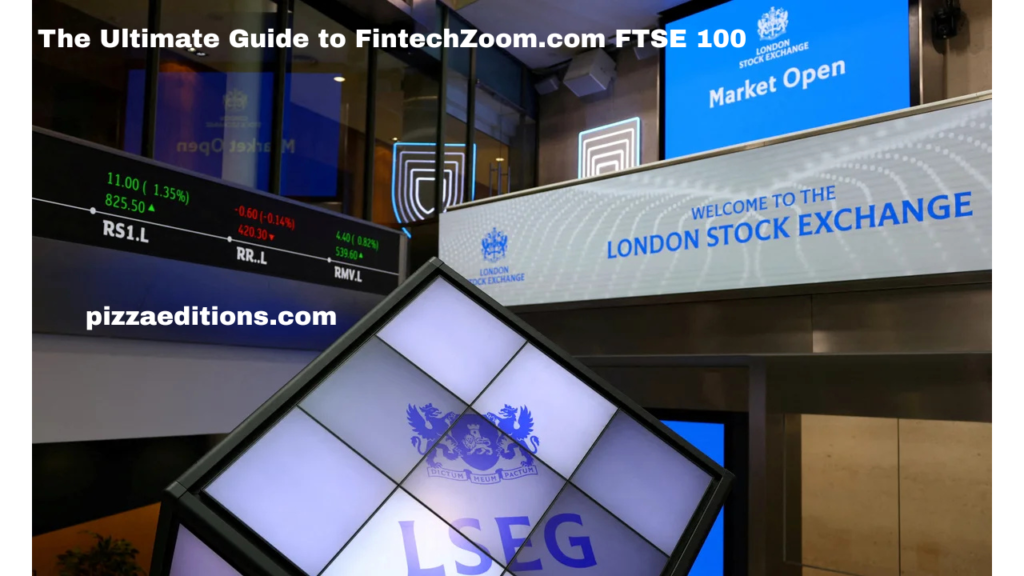In today’s digitally-driven financial world, staying informed is as crucial as making the right investments. Among the many players in financial media and stock market analysis, two stand tall for their depth, consistency, and impact—FintechZoom.com and the FTSE 100. Together, they represent the fusion of modern fintech reporting with a longstanding benchmark of the UK’s financial market.
This guide takes a deep dive into “The Ultimate Guide to FintechZoom.com FTSE 100: A Comprehensive Look at Two Powerhouses of Financial Reporting and Stock Market Performance”, analyzing both platforms from multiple angles—what they are, how they influence investors, and why they matter in today’s economic climate.
What Is FintechZoom.com? A Fintech Titan in Reporting

FintechZoom.com is an increasingly popular financial news and data platform that caters to the growing need for real-time, high-quality, and accessible financial insights. From cryptocurrency trends to global market updates and detailed stock analysis, the site has carved out a niche among retail investors, financial professionals, and fintech enthusiasts.
Unlike traditional news sources, FintechZoom is built for the fast-paced digital world. It focuses on delivering concise, data-driven content—often tailored for mobile-first audiences. Its appeal lies in blending tech innovation with financial expertise, which is essential for today’s fast-evolving markets.
FintechZoom’s interface allows readers to easily navigate across sections like stock market forecasts, tech stock updates, economic commentary, and sector-specific analysis. Its reporting on financial instruments like Bitcoin, Tesla stock, or central bank policy changes has grown immensely popular, often being cited across forums and discussions.
FTSE 100: The Legacy Index of British Market Might

On the other side of the spectrum lies a name synonymous with stock market performance—the FTSE 100. The Financial Times Stock Exchange 100 Index, better known as the FTSE 100, is a share index of the 100 companies listed on the London Stock Exchange with the highest market capitalization.
Since its creation in 1984, the FTSE 100 has been the most widely watched measure of the UK’s economic success. It comprises global powerhouses such as BP, HSBC, Unilever, and GlaxoSmithKline, giving it not just national but worldwide prominence. Investors and analysts depend on the FTSE 100 to assess wider market sentiment and to evaluate the health of both the UK and, sometimes, the global economy.
Its composition is updated quarterly to ensure it reflects the changing dynamics of the corporate world. For many institutional investors, ETFs and index funds that track the FTSE 100 serve as foundational assets within diversified portfolios.
Why the Combination Matters: FintechZoom.com Meets the FTSE 100
When combining FintechZoom.com’s real-time, decentralized approach to market reporting with the authoritative weight of the FTSE 100, you get a powerful duo that encapsulates the modern investor’s ecosystem.
FintechZoom covers the FTSE 100 in great detail, offering articles on daily movements, technical analysis, investor sentiment, and upcoming earnings reports. For those looking to understand market dynamics from both a historical and a real-time lens, this combination is invaluable.
- FintechZoom brings speed and accessibility to data.
- FTSE 100 brings stability, legitimacy, and historical weight to stock market evaluation.
This blend of immediacy and depth ensures that readers not only stay informed but also understand the underlying currents shaping those news stories.
FintechZoom FTSE 100 Coverage: What to Expect

When you navigate to FintechZoom’s FTSE 100 content, you’ll find more than just numbers and charts. The platform breaks down the components of the index, offers stock-specific insights, and curates weekly and monthly trend reports that help investors position their portfolios more strategically.
Common content features include:
- Stock Spotlight Articles: Deep dives into particular FTSE 100 components like Rolls-Royce, Tesco, or Barclays.
- Technical Analysis Reports: Daily or weekly analysis of market movement, resistance levels, and trade volumes.
- Investor Sentiment Polls: Capturing retail and institutional investor emotions.
- Economic Policy Impacts: Articles examining how Bank of England policies ripple across the FTSE 100.
- Sector Watch: Coverage of how sector categories like energy, banking, or consumer staples are doing inside the index.
FintechZoom ensures its FTSE 100 articles are not only timely but tailored for action—giving you the “why it matters” context so you can act, not just observe.
How FintechZoom.com Empowers Retail and Institutional Investors
One of FintechZoom’s most compelling strengths lies in its democratization of financial knowledge. Whether you’re a retail investor trading from your smartphone or a seasoned hedge fund analyst, the insights provided on FintechZoom help bridge the information gap.
- Retail Investors benefit from simplified charts, trend analysis, and intuitive breakdowns of economic indicators.
- Institutional Users can extract value from aggregated market sentiment, real-time market reactions, and early coverage of earnings surprises or central bank commentary.
FintechZoom’s approach to FTSE 100 coverage is particularly useful for non-UK investors seeking a window into one of the most influential indices outside of the US markets.
Why the FTSE 100 Still Matters Globally
In an age dominated by tech-heavy US indices like the NASDAQ and S&P 500, the FTSE 100 holds its ground by providing something unique—diversification and international exposure.
Unlike the tech-centric focus of US indices, the FTSE 100 is:
- Rich in energy, pharmaceuticals, and finance, giving investors exposure to sectors often underrepresented elsewhere.
- Highly international in earnings—with a large portion of FTSE 100 company revenue coming from outside the UK.
- A hedge against dollar-dominated assets, especially important during periods of USD volatility.
Global events such as Brexit, pandemic recovery, or interest rate changes often have distinct effects on the FTSE 100, giving global investors yet another reason to watch the index closely. FintechZoom helps interpret those ripple effects for a wider audience.
The Future of Financial Reporting: Merging Legacy with Innovation
The evolution of financial literacy and market participation has created a demand for platforms that offer both historical reliability and digital agility. This is where the theme of “The Ultimate Guide to FintechZoom.com FTSE 100: A Comprehensive Look at Two Powerhouses of Financial Reporting and Stock Market Performance” becomes more than a title—it becomes a reality.
- FintechZoom.com represents the agile, forward-looking, decentralized nature of fintech journalism.
- The FTSE 100 stands as the cornerstone of established, regulated, and historically consistent market metrics.
Together, they shape how new generations learn, invest, and grow their wealth in increasingly complex financial ecosystems.
Conclusion: Two Titans, One Unified Vision for Market Insight
In wrapping up this guide to FintechZoom.com FTSE 100: A Comprehensive Look at Two Powerhouses of Financial Reporting and Stock Market Performance, it’s clear that these two platforms, although distinct in function and origin, serve a unified purpose—empowering investors.
FintechZoom brings the world of financial reporting to your fingertips with unmatched speed and modern clarity, while the FTSE 100 offers a solid, time-tested framework to gauge economic and corporate performance. Their convergence provides a 360-degree view of the markets—from daily fluctuations to long-term trends.
Whether you’re just beginning your investment journey or you’re a seasoned market watcher, tapping into both FintechZoom and the FTSE 100 is not just useful—it’s essential for staying ahead in today’s data-driven financial world.
Also Read : Social Security COLA 2025: Expected Adjustments, Predictions, and Impact on Beneficiaries
